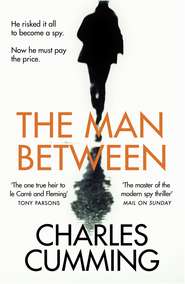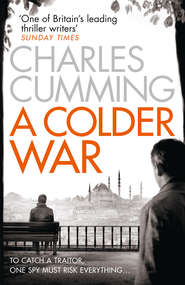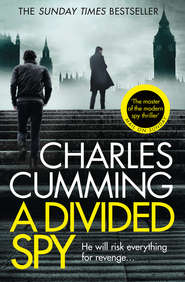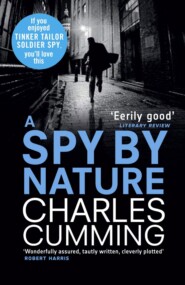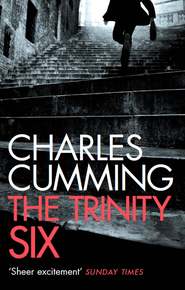По всем вопросам обращайтесь на: info@litportal.ru
(©) 2003-2024.
✖
A Foreign Country
Автор
Год написания книги
2019
Настройки чтения
Размер шрифта
Высота строк
Поля
Kell felt that he knew the answer to his own question. Amelia’s story made no sense. It wasn’t like her to attend a painting course; a woman like that didn’t need a hobby. In all the years that he had known Amelia, she had used her holidays as opportunities for relaxation. Health spas, detox clinics, five-star lodges with salad bars and wall-to-wall masseurs. She had never spoken of a desire to paint. As Marquand contemplated his answer, Kell walked across the stretch of unmown ground, pulled the plastic bag clear of the tree and stuffed it into the back pocket of his jeans.
‘You’re a model citizen, Tom, a model citizen.’ Marquand looked down at his shoes and gave a heavy sigh, as if he was tired of making excuses for the failings of other men. ‘Of course there’s nothing unusual about taking a holiday this time of year. But usually we have more warning. Usually it goes in the diary several months in advance. This looked like a sudden decision, a reaction to something that Haynes had told her.’
‘What was Haynes’s view on that?’
‘He agreed with Truscott. So they asked some friends in Nice to keep an eye on her.’
Again, Kell kept his counsel. Towards the end of his career, he had himself become a victim of the paranoid, near-delusional manoeuvrings of George Truscott, yet he was still privately astonished that the two most senior figures in the Service had green-lit a surveillance operation against one of their own.
‘Who are the friends in Nice? Liaison?’
‘Christ, no. Avoid the Frog at all costs. Re-treads. Ours. Bill Knight and his wife, Barbara. Retired to Menton in ’98. We got them to sign up for the painting course, they saw Amelia arrive on Wednesday afternoon, enjoyed a bit of a chat. Then Bill reported her missing when she failed to turn up three mornings in a row.’
‘What’s unusual about that?’
Marquand frowned. ‘I’m not sure I follow you.’
‘Well, couldn’t Amelia have taken a couple of days off? Got sick?’
‘That’s just it. She didn’t call it in. Barbara rang the hotel, there was no sign of her. We telephoned Amelia’s husband –’
‘– Giles,’ said Kell.
‘Giles, yes, but he hasn’t heard from her since she left Wiltshire. Her mobile is switched off, she’s not responding to emails, there’s been no activity on her credit cards. It’s a total blackout.’
‘What about the police?’
Marquand bounced his caterpillar eyebrows and said: ‘Bof ’ in a cod French accent. ‘They haven’t scraped her off a motorway or found her body floating in the Med, if that’s what you mean.’ He saw Kell’s reaction to this and felt compelled to apologize. ‘Sorry, that was tasteless. I didn’t mean to sound glib. This whole thing is a bloody mystery.’
Kell ran through a list of possible explanations, as arbitrary as they were inexhaustible: Russian or Iranian interference in some aspect of Amelia’s personal affairs; a clandestine arrangement with the Yanks relating to Libya and the Arab Spring; a sudden crisis of faith engendered by something in the meeting with Haynes. In the run-up to Kell’s demise at SIS, Amelia had been knee-deep in Francophone West Africa, which might have aroused interest from the French or Chinese. Islamist involvement was a permanent concern.
‘What about known aliases?’ He felt the dryness of his hangover again, the bluntness of three hours’ sleep. ‘Isn’t it possible she’s running an operation, one that Tweedledum and Tweedledee know nothing about?’
Marquand conceded the possibility of this, but wondered what was so secret that it would require Amelia Levene to disappear without at the very least enlisting the technical support of GCHQ.
‘Look,’ he said. ‘The only people who know about this are Haynes, Truscott and the Knights. Paris Station is still in the dark and it needs to stay that way. This leaks out, the Service will be a laughing stock. God knows where it would end. She’s due to meet the PM formally in two weeks’ time. Obviously that meeting can’t be cancelled without creating a gold-tinted Whitehall shitstorm. Washington finds out we’ve lost our most senior spy, they’ll go ballistic. Haynes wants to find her within the next few days and pretend that none of this happened. She’s due back Monday week.’ Marquand looked quickly to his right, as though reacting to a sudden noise. ‘Look, maybe she’ll just show up. It’ll probably be some smoothie from Paris, a Jean-Pierre or a Xavier with a big cock and a gîte in Aix-en-Provence. You know what Amelia’s like with the boys. Madonna could take notes.’
Kell was surprised to hear Marquand talk of Amelia’s reputation so candidly. Philandering, like alcohol, was almost an Office prerequisite, but it was a male sport, jocular and off the books. In all the years that Kell had known her, Amelia had had no more than three lovers, yet she was spoken of as though she had slept her way through seventy-five per cent of the Civil Service.
‘Why Paris?’
Marquand looked up. ‘She stopped there on the way down to Nice.’
‘My question stands. Why Paris?’
‘She went to the funeral on Tuesday.’
‘Whose funeral?’
‘I have absolutely no idea.’ For a dyed-in-the-wool careerist, Marquand didn’t seem unduly concerned about admitting to gaps in his knowledge. ‘All this has happened very fast, Tom. We haven’t been able to get a name. Giles thinks she went to a crematorium in the Fourteenth. Montparnasse. An old friend from student days.’
‘He didn’t go with her?’
‘She told him he wasn’t wanted.’
‘And Giles does what Giles is told to do.’ Kell knew all too well the mechanics of the Levene marriage; he had studied it closely, as a cautionary tale. Marquand looked as if he was about to laugh but thought better of it.
‘Precisely. Dennis Thatcher syndrome. Husbands should be seen and not heard.’
‘Sounds to me like you need to find out who the friend was.’ Kell was stating the obvious, but Marquand appeared to have run out of road.
‘Do I take that as an indication that you’ll help?’
Kell looked up. The branches of the tree were obscuring a charcoal sky. It was going to rain. He thought of Afghanistan, of the book he was meant to be writing, of the vapid August nights stretching ahead of him at his bachelor’s bedsit in Kensal Rise. He thought about his wife and he thought about Amelia. He was convinced that she was alive and convinced that Marquand was hiding something. How many other re-treads would be sent on her tail?
‘How much is Her Majesty offering?’
‘How much would you need?’ It was somebody else’s cash, so Jimmy Marquand could afford to splash it about. Kell didn’t care about the money, not at all, but didn’t want to appear sloppy by not asking. He plucked a figure out of the damp afternoon sky. ‘A thousand a day. Plus expenses. I’ll need a laptop, encrypted, ditto a mobile and the Stephen Uniacke alias. Decent car waiting for me at Nice airport. If it’s a Peugeot with two doors and a tape deck, I’m coming home.’
‘Sure.’
‘And George Truscott pays my speeding fines. All of them.’
‘Done.’
6
Kell caught a flight out of Heathrow at eight. As he was switching it to ‘Flight Mode’, a text message came through on his mobile phone:
Don’t forget appointment tomorrow. 2pm Finchley. Meet you at the Tube.
Finchley. The death throes of his marriage. An hour with a grim-faced guidance counsellor who offered up platitudes like biscuits on a plate. It occurred to Kell, clicking his seat belt on the aisle, that this was only the second time that he had left London in the eight months since his departure from SIS. In mid-March, Claire had suggested a ‘romantic weekend’ in Brighton – ‘to see if we can be more than ships passing in the night’ – but the hotel had played host to an all-night wedding party, they had slept for only three hours, and by Sunday were lost in a familiar blizzard of recrimination and argument.
A young mother was seated beside him on the plane, a toddler strapped into the window seat. She had come prepared for the battle ahead, producing a bag stuffed with magazines and stickers, sugar-free biscuits and a bottle of water. Every now and again, when the boy fidgeted too much or screamed too loudly, his mother would offer up a knowing smile that was halfway to an apology. Kell tried to reassure her that he couldn’t care less: it was only an hour and a half to Nice and he liked the company of children.
‘Do you have kids of your own?’ she said, the question that should never be asked.
‘No,’ Kell replied, picking up a green plastic figurine that had fallen on the floor. ‘Sadly not.’
The mother was preoccupied throughout the flight and Kell was able to read the notes he had made from Amelia’s classified file without being concerned about wandering eyes: the man in the seat across the aisle was engrossed in a spreadsheet; the woman behind him, over his left shoulder, asleep on an inflatable neck pillow. He knew most of Amelia’s story already; they had swapped secrets during the strange intimacy of a fifteen-year friendship. Her journey into the secret world had begun at a young age. While working in Tunis as an au pair in the late 1970s Amelia had been talent-spotted by Joan Guttmann, a deep-cover officer with the Central Intelligence Agency. Guttmann had brought Amelia to the attention of SIS, which had kept an eye on her at Oxford, making an initial move to recruit soon after she had been awarded a starred First in French and Arabic in the summer of 1983. After a year at MECAS, the so-called ‘School for Spies’ in Lebanon, she had been posted to Egypt in ’85 and to Iraq in ’89. Returning to London in the spring of 1993, Amelia Weldon had met and quickly become engaged to Giles Levene, a fifty-two-year-old bond trader with thirty million in the bank and a personality described by one of Kell’s former colleagues as ‘aggressively soporific’. The file noted, with a passive anti-Semitism of the sort Kell believed had largely died out within SIS, that Levene was considered ‘ambivalent’ on Israel, but that his wife’s ‘attitudes in that area’ should ‘nevertheless be monitored for indications of bias’.
In such a context, Amelia’s rise to power made for fascinating reading. There had been an astonishing amount of sexism directed towards her, particularly in the early phase of her career. In Egypt, for example, she had been overlooked for promotion on the grounds that she was unlikely to remain in the Service ‘beyond child-bearing years’. The position had gone instead to a celebrated Cairo alcoholic with two marriages behind him and a record of producing CX reports lifted from the pages of Al-Ahram. Her fortunes began to shift in Iraq, where she worked under non-official cover as an analyst for a French conglomerate. An Irish passport had kept ‘Ann Wilkes’ in Baghdad for the duration of the first Gulf War, and her access to officials in the Ba’ath party, as well as to prominent figures in the Iraqi military structure, had been lauded both in London and in the United States. Since then, her career had gone from strength to strength: there were postings in Washington and to Kabul, where she had operational control of SIS operations throughout Afghanistan for more than two years following the toppling of the Taliban. In an indication of her ambitions for the Service, she had argued for a more robust British influence in Africa, a stance viewed as prescient by Downing Street in the wake of the Arab Spring, but one that had brought her into conflict with George Truscott, a corporatized bureaucrat with a Cold War mindset who was widely despised by the rank and file within SIS.
Kell closed the notebook. He looked at the child beside him, now sleeping in his mother’s arms, and tried to relish some sense of being back in the game. Yet he felt nothing. For eight months he had been treading water, pretending to himself and to Claire that he had taken a principled stand against the double-think and mendacity of the secret state. It was nonsense, of course; they had turfed him out in disgrace. And when Marquand had come calling, the bagman for Truscott and Haynes, Kell had jumped back aboard like a child at a fairground, relishing the prospect of another ride. He realized that any determination he had felt to prove them wrong, to proclaim his innocence, even to create a new life for himself, had been built on sand. He had nothing but his past to live on, nothing but his skills as a spy.
Somewhere over the southern Alps the cabin lights dimmed like an eye test. The flight was on time. Kell looked out of the starboard window and searched for the glow of Nice. A stewardess strapped herself into a rear-facing seat, checked her face in a compact mirror and flashed him an air-conditioned smile. Kell nodded back, necked two aspirin and the remains of a bottle of water, then sat back as the plane banked over the Mediterranean. The landing earned the captain a round of applause from three drunken Yorkshiremen seated two rows behind him. Kell had no luggage in the hold and had cleared Immigration, on his own passport, by eleven fifteen.
The Knights were in Arrivals. Jimmy Marquand had told him to look out for ‘a British couple in their mid-sixties’, he ‘a denizen of the tanning salon with a dyed moustache’, she ‘a tiny, rather sympathetic bird who’s quick on her feet but permanently in her husband’s shadow’.






